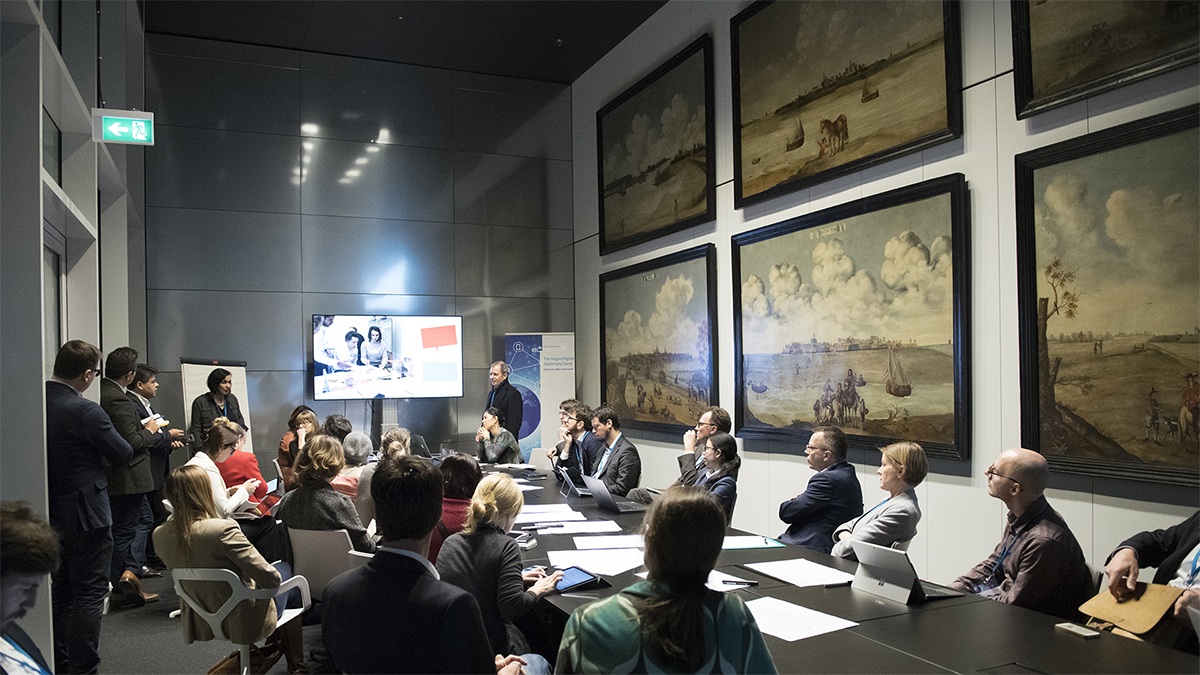We are experiencing a structural change in the function of diplomats due to the changing role of the nation state in our globalized and increasingly digital and networked world.
Future Diplomacy Lab by Hybrid Space Lab creates an inspirational space to speculate on possible diplomacy applications by projecting onto diplomacy innovative digital solutions from numerous fields.
Lectures & Workshop Future Diplomacy Lab @ Digital Diplomacy Camp, Embassy Kingdom of the Netherlands, Brussels, 7 February 2019
Digital
Diplomacy
Camp
One year after the first edition of Diplomacy Camp, issues like disinformation, AI and the civic impact of digital technology have only become more contentious, particularly in Europe. With Brexit on the horizon, European elections looming, the rise of China as a technological superpower and continuing security challenges on the continent’s eastern and southern flanks, Europe’s diplomats need to grasp the opportunities and threats of digital technology now, more than ever.
The Dutch Ministry of Foreign Affairs invited 150 diplomats, journalists, NGOs, academics, technologists and entrepreneurs to discuss these issues and work on solutions at the second “Brussels” edition of the unconference ‘Digital Diplomacy Camp’ on Thursday 7 February 2019 at its Permanent Representation to the EU in Brussels.
We want to share with you what was discussed at #DiploCamp by sharing the notes the attendees made. We went through them and
Digital Diplomacy Camp is organised by The Netherlands Ministry for Foreign Affairs in cooperation with: Hybrid Space Lab, USC Centre on Public Diplomacy, RNW Media, University of Oxford #DigDiplROx, and Ministry for Foreign Affairs, Sweden.
Future
Diplomacy
Lab
Transferring ideas from one field to another is an acknowledged innovation method. Uprooting concepts and tools from their original context and applying them elsewhere allows for outside-the-box adaptive thinking and previously unthought-of hybrid solutions. As digitalization is the common denominator that nowadays brings about major changes in almost all fields, the ‘transfer’ of digital innovation concepts could optimally promote innovative creative thinking processes.
If we stretch our vision beyond the immediate fields of application, how can AI, Fintech, mobility start-ups, platform economy and other digital innovations inform diplomacy?
As pressing questions populate the debate on the consequences of technology for diplomacy, the Future Diplomacy Lab Workshop creates an inspirational space to speculate on possible diplomacy applications. Future Diplomacy Lab is a timely response to the need for hybrid solutions, fostering trans-disciplinary exchanges and interactions. Future Diplomacy Lab is a collaboratively creative environment, where solutions and ideas can flow from their respective fields of expertise and mutually nuance each other, towards a more comprehensive diplomacy fit for the Digital Age.
Digital
Diplomacy
Technology devices, artificial intelligence and digital transformations are becoming ever more pervasive in processes until recently perceived as specifically human – such as care, health-care, intercultural communication and negotiation. From AI-powered language recognition software to automated management of chronic diseases monitoring, to face and image recognition, applications span from business, to healthcare and care settings, to security and diplomacy.
If we stretch our vision beyond the most immediate fields of application of digitalization, how can AI, Fintech, mobility start-ups, platform economy and other digital innovations inform diplomacy?
Artificial Intelligence has trickled down to the everyday, from data-driven marketing to digital assistants. Because of its capacity to store and process huge data flows, this technology has enabled the development of AI diplomacy, with automated processing being researched and increasingly adopted to make agreements, increase countries’ self-reliance and shift the global power balance. AI applications for diplomacy and international relations are currently hard to fully grasp – How and to what extent would AI-powered, faultlessly logic options for conducting negotiations merely support human decision-making?
Financial Technology (Fintech) is another fast-expanding digital domain. Over the next few years, Fintech is expected to grow its impact on and pervasiveness in the life of an increasing pool of customers. Thanks to the peaking diffusion of smartphone technology and Internet access in areas where financial inclusion is lacking, Fintech is driving a democratization of financial services. For Fintech’s companies, this translates into taking the latters’ exclusivity away from conventional, large institutions as well as focusing on the target group of underbanked and unbanked individuals. How can Fintech change the global financial power balance, and how can diplomacy ensure it bring genuine benefits for citizens, without compromising on regulatory compliance?
With security and transparency amongst participants as its signature features and the related capacity to prevent fraud, Blockchain technology is amongst the strongest candidates to address these concerns. Blockchain technology is gaining special traction as the basis for services conventionally laden with bureaucracy and governed by intermediaries, in trust-less areas such as compliance regulations, insurances, and contracts. With tools like AI-powered anti money-laundering software, Regulatory Technology (Regtech) will be increasingly applied in compliance, risk management and monitoring of transaction.
One of the most widely advertised opportunities related to technology is democratization of processes and increased accessibility, ultimately leading to an empowerment of citizens in managing their life, be it with regards to healthcare, business, security or personal finance. As a consequence, numerous processes and transactions can take place without previously necessary intermediaries.
How could this tendency impact diplomacy, if it lowers the need for intermediary institutions?
As technology and digital transformations are allowing and facilitating the rise of platforms for an ever increasing number of economic and social activities, the current economic arrangement can be described as a platform economy, featuring giants like Facebook, Amazon, Netflix and Airbnb.
* How can AI, Fintech, mobility start ups, and platform economy and other digital innovations inform diplomacy?
* How and to what extent would AI support human decision-making, for example, in negotiations?
* How would a technology-powered peer-to-peer diplomacy affect traditional diplomatic institutions?
* What changes does diplomacy need to undergo to meet the needs of increasingly digital citizens?

related PROJECTS